Eco-friendly flooring options are becoming increasingly popular in both residential and commercial settings as people become more aware of their environmental impact. Flooring is a major component of any home or business because it has a large impact on the overall look and mood of the premise. It is also usually one of the most expensive investments.
Why choose Eco-friendly floors?
Because flooring is expensive, it is important that one chooses a floor that can last long, and Eco friendly. They are made from sustainable materials that are much less damaging to the environment than traditional flooring materials, such as vinyl and linoleum. Eco-friendly flooring is also much more durable, so it can last for decades with proper care. Furthermore, it often looks just as good as traditional flooring and can even add a unique touch to a room.
When choosing eco-friendly flooring, you can choose from a variety of materials, such as bamboo, cork, linoleum, and recycled plastic. Different people will choose different materials for different reasons. For example, bamboo is extremely durable and is also a renewable resource, making it an excellent choice for those who want to reduce their environmental impact.
Types of Eco-friendly Floors
Bamboo:
Bamboo is a highly sustainable and eco-friendly flooring option that is also extremely durable and attractive. Bamboo flooring is made from a renewable source, and it is also formaldehyde-free, making it a healthy choice for your home. Bamboo is considered a green building material because it grows quickly, replenishes itself, and is harvested without the use of pesticides or harmful chemicals.
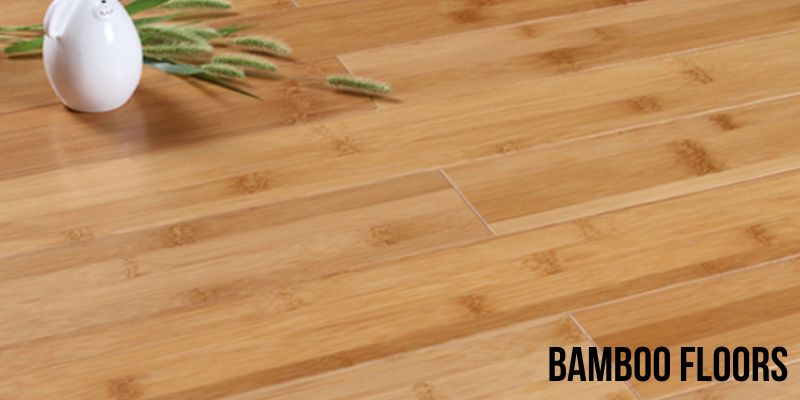
Pros and Cons of Bamboo Floors
| Pros of Bamboo Flooring | Cons of Bamboo Flooring |
| Bamboo flooring is eco-friendly, as it is made from a renewable resource. | Bamboo flooring can be vulnerable to staining and water damage if not properly sealed. |
| It is very durable and resistant to wear and tear. | It can be difficult to repair if damaged. |
| Bamboo flooring is easy to install and maintain. | Bamboo flooring can be susceptible to fading when exposed to direct sunlight for extended periods. |
| It is also very affordable, making it a great choice for budget-conscious homeowners. | It can be more expensive than other types of flooring. |
| Bamboo flooring is also resistant to moisture, making it a great choice for bathrooms and kitchens when properly sealed. |
Also read: Hardwood Floors
Cork:
Cork flooring is an excellent eco-friendly choice for many reasons. First of all, it is a renewable resource as it is harvested from cork oak trees, which are not harmed in the process and can be harvested again and again for many years. Secondly, cork is a natural insulator and helps keep homes warmer in the winter and cooler in the summer, reducing energy costs. Additionally, cork is made from natural materials making it completely biodegradable, meaning it can be recycled at the end of its useful life.
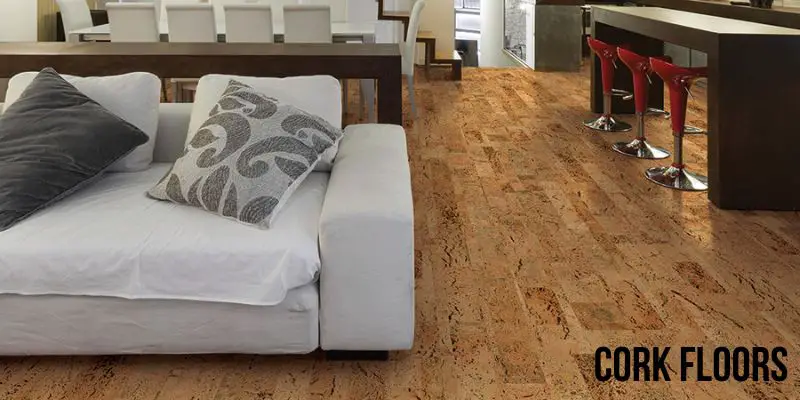
Finally, cork is naturally hypoallergenic and resistant to mold, mildew, and dust mites, making it a great choice for people who suffer from allergies
In summary, cork is an excellent choice for an eco-friendly floor. It is a renewable resource, a natural insulator, and biodegradable. All of these factors make cork an ideal choice for those looking for an eco-friendly flooring solution.
Pros and Cons of Cork Floors
| Pros of Cork Floors | Cons of Cork Floors |
| Cork floors offer a softer surface than most other flooring types, providing a more comfortable standing surface and reducing fatigue. | Cork floors are susceptible to water damage, so it is important to use a sealant to protect the cork from moisture. |
| Cork is a natural, renewable resource, making it a great choice for those looking for an eco-friendly flooring option. | They can be more expensive than other types of flooring, making them a more expensive option for those on a budget. |
| Cork is naturally resistant to mold and mildew, making it a great choice for those with allergies. | Cork floors can be easily scratched or dented, so they may not be the best choice for those with pets or children. |
| They are naturally fire-resistant, making it a safer option in the event of a fire. | They require regular maintenance to keep them looking their best. |
| It is very easy to clean, requiring only regular vacuuming and occasional sweeping or damp mopping. | |
| Cork floors are available in a variety of styles and colors, making it easy to find the perfect look for your home. |
Linoleum:
Linoleum is one of the most eco-friendly flooring options available. It is made from natural materials such as linseed oil and wood flour, making it an eco-friendly and sustainable option. It is also naturally hypoallergenic and extremely durable.
Linoleum is a durable and easy-to-maintain flooring option. It does not scratch or dent easily and can handle heavy foot traffic without wearing down. Unlike other flooring options, linoleum does not require special cleaning products or techniques to keep it looking new. This is because it is naturally resistant to dirt, dust, and stains.
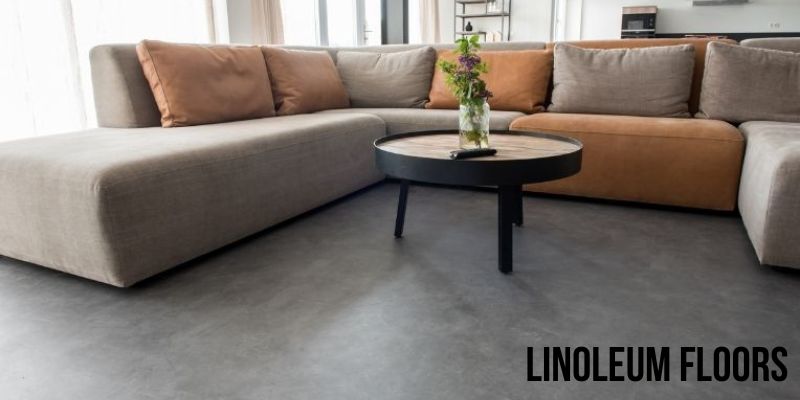
Finally, linoleum is a recyclable product. This means that when it comes time to replace your floor, you can send it off to be recycled and used to create new products.
Pros and Cons of Linoleum Floors
| Pros of Linoleum Floors | Cons of Linoleum Floors |
| Linoleum is a sustainable and renewable resource that is made from natural materials like linseed oil, cork dust, wood flour, and limestone. | Linoleum can be damaged by high traffic and heavy furniture. |
| It is durable, long-lasting, and easy to maintain. | It can be easily scratched and dented if not properly cared for. |
| It is water-resistant and doesn’t require sealing. | Linoleum can fade over time from sunlight and other sources of UV radiation. |
| Linoleum is non-toxic, hypoallergenic, and antibacterial. | It requires regular cleaning and maintenance to keep it looking its best. |
| It is available in a variety of colors and patterns, making it a great choice for any decor style. | It can be difficult to repair if it is damaged or stained. |
| It is slip-resistant, making it a good choice for areas of the house where there is a high risk of slipping, such as the bathroom or kitchen. | It is not as durable as some other types of flooring. |
Reclaimed Wood:
Reclaimed wood is an excellent eco-friendly and sustainable flooring option as it is made from already-used wood that would otherwise go to waste. Reclaimed wood is also extremely durable and it can add a unique character to your home.
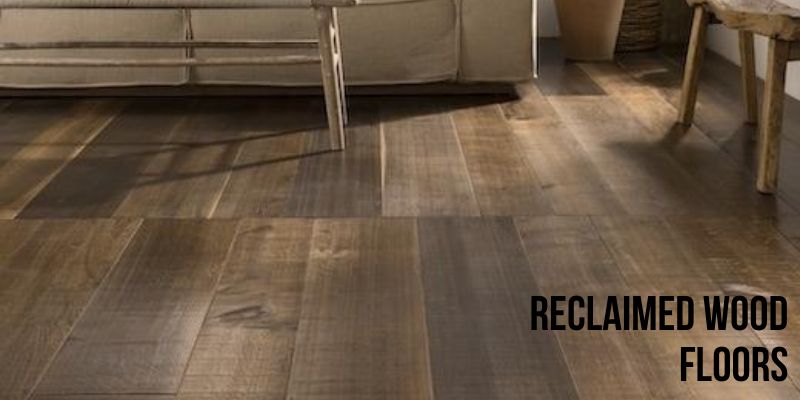
Pros and Cons of Reclaimed Wood
| Pros of Reclaimed Wood | Cons of Reclaimed Wood |
| It is taken from existing materials and repurposed, Thus making it Eco-friendly | Reclaimed wood may be more difficult to source, as it is not always readily available. |
| Reclaimed wood is often of higher quality than newly sourced wood, as it has stood the test of time. | Reclaimed wood may contain insects or parasites, so it is important to inspect it before purchasing. |
| Reclaimed wood has a unique character and patina that is difficult to replicate with new wood. | Reclaimed wood is often more expensive than new wood, depending on the type of wood and the source. |
| They can often be cheaper than new wood. | Reclaimed wood may have an odor or be covered in dirt, so it may need to be cleaned before use. |
Stone Tile:
Stone tile floors are becoming increasingly popular for their environmental sustainability and natural beauty. Stone tile is a great choice for eco-friendly flooring because it is a natural product, has a long lifespan, and can be recycled.
As a natural material, stone tile is made from a variety of natural materials such as granite, slate, marble, and limestone. These materials are abundant and can be mined with minimal environmental impact. In addition, stone tile is also durable and easy to maintain, meaning it can last for decades with proper care. This longevity helps to reduce the number of resources needed to replace the flooring, making it a more environmentally friendly choice.
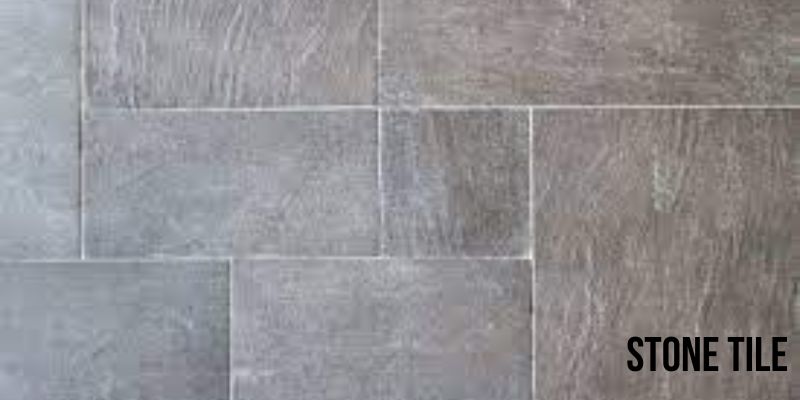
Pros and Cons of stone tile
| Pros of stone tile | Cons of stone tile |
| Stone tile is durable, long-lasting, and scratch-resistant. | Stone tile is expensive, and installation costs can be high. |
| It is available in a variety of colors, sizes, shapes, and textures. | It is heavy and difficult to install. |
| Natural stone tile is an easy-to-maintain material that can be used in both residential and commercial settings. | Stone tiles need to be sealed periodically to prevent staining. |
| Stone tile adds value and character to a home or business. | Natural stone tile can be slippery when wet. |
| It is available in a variety of finishes, including polished, honed, and tumbled. | Some types of stone require special cleaning products and techniques. |

